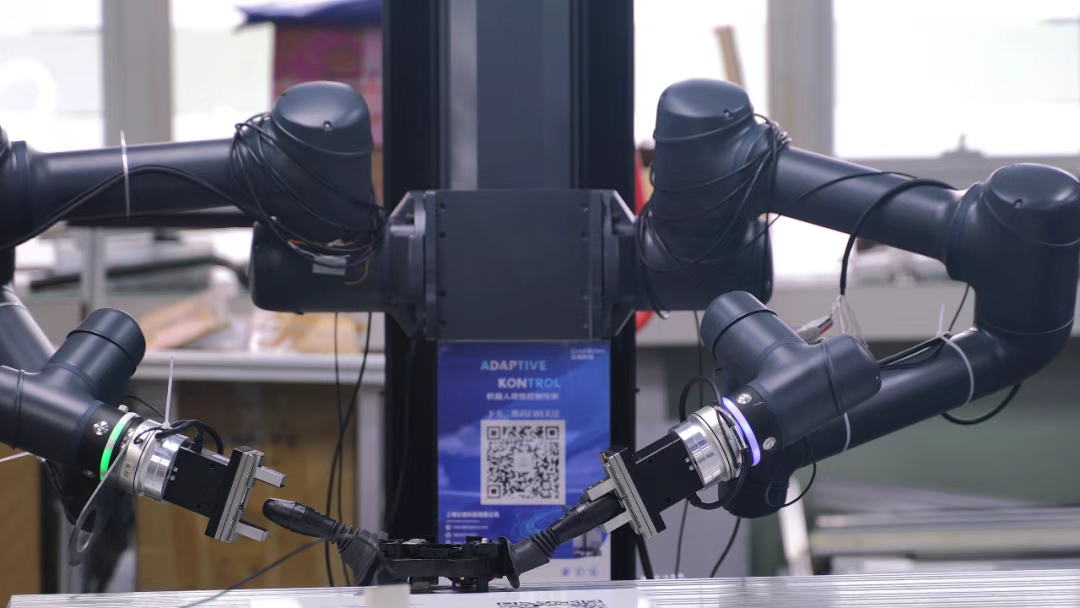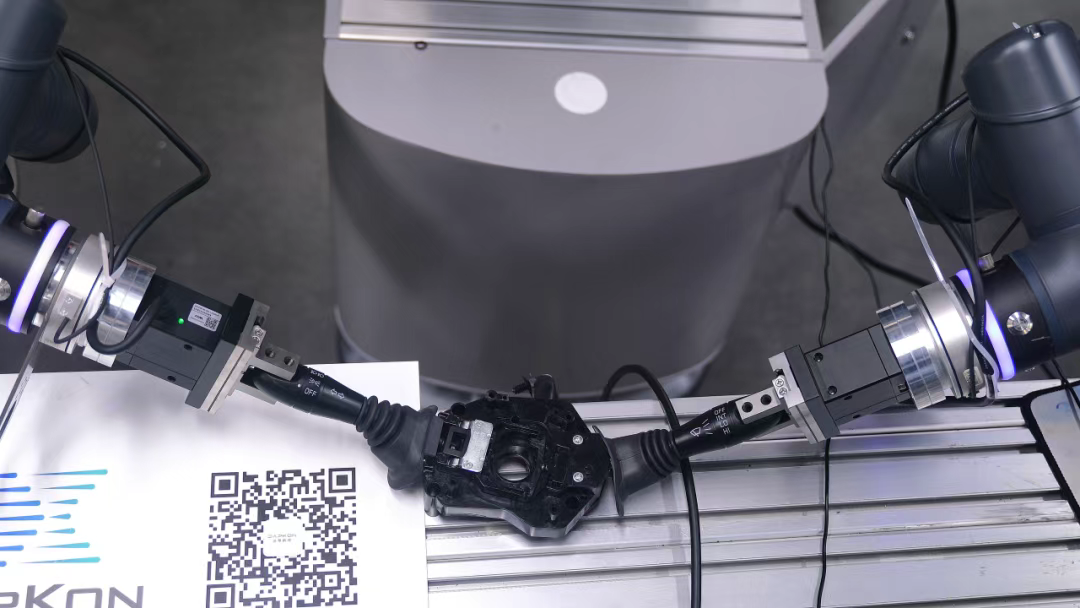- This topic is empty.
-
AuthorPosts
-
2025-08-04 at 2:15 pm #4331
In the automotive manufacturing sector, robotic force control technology, with its unique technical characteristics and wide-ranging applications, is bringing new breakthroughs to automotive parts inspection.
Dapkon's robotic force control technology, integrating force sensing with intelligent algorithms, has established an efficient, stable, and safe automated inspection system for automotive steering wheel levers, helping companies achieve both improved production efficiency and quality.
Dapkon's independently developed flexible force control system has been successfully implemented in automated inspection scenarios by several well-known manufacturers, driving the automation, intelligence, and digitization of their inspection processes.
1. Difficulties of Inspection
Manual inspection is highly subjective, and results rely entirely on the operator's experience and daily conditions, making it prone to missed or incorrect detections.
Manual inspections suffer from poor consistency. Repeatability is low when the same person performs multiple inspections, or when different people perform inspections, making it impossible to produce quantifiable, objective data.
Insufficient precision and flexibility: Traditional industrial robots lack precision when simulating complex tasks such as "light shifting," "quick shifting," and "holding," and are prone to damage due to excessive force.
2. Advantages of Dapkon Force Control Inspection
Dapkon's robotic force control technology uses multi-dimensional force sensors to capture the interaction force between the end arm and the workpiece in real time. Based on a pre-set algorithm, it dynamically adjusts the motion trajectory and force application strategy, forming a closed-loop control system. This technology offers significant advantages in automotive steering wheel lever inspection:
Test consistency assurance: Dapkon's robotic force control system utilizes force-position hybrid control technology. The robot dynamically adjusts the applied force throughout the lever's travel, ensuring consistent force for each shift. This eliminates the variability of manual operation and effectively avoids errors caused by uneven force application during manual inspection. Furthermore, the robotic force control system is unaffected by human factors such as fatigue and inattention, significantly improving the reliability of inspection results. Dapkon's software features built-in dual monitoring modes: "displacement-force" and "time-force."
Real-time Data Collection: The Dapkon robotic force control inspection system collects inspection data in real time and displays it intuitively via curves within the user interface, meeting manufacturers' needs for recording seat inspection data. Furthermore, the system records process data in real time (at the millisecond level) during every servo cycle, fully ensuring process traceability, reproducibility, and twinning. This not only helps users efficiently accumulate on-site process data but also provides a solid foundation for continuous process optimization, driving steady improvements in production efficiency and quality.
Multi-task Compatibility: Steering wheel lever inspections require multiple tasks, including functional testing (such as gear shifting and lighting control), durability testing (simulating tens of thousands of operations), and force calibration. The Dapkon robotic force control system utilizes modular parameter configurations to quickly switch between different inspection modes. For example, during durability testing, the system can stably output the preset reciprocating force, ensuring consistency across tests. During force calibration, a high-precision force control algorithm corrects for errors in the robotic arm's force application, ensuring the reliability of test data.
High Testing Efficiency: Traditional manual testing requires operators to perform functional tests on each steering wheel lever individually, which is time-consuming, labor-intensive, and susceptible to fatigue. The robotic force control system enables 24-hour, uninterrupted operation.
Overload Protection: When a lever lever experiences a sudden increase in resistance due to assembly anomalies, the Dapkon robotic force control system automatically triggers a pause or retraction command to prevent component damage. For example, Dapkon's dynamic protection function monitors force limits in real time to protect high-value components.
Flexible Adaptability to Diverse Testing Needs: The Dapkon force control system is highly adaptable and can meet customer testing needs for various vehicle steering wheel lever types, sizes, and materials. Operators can adjust parameters such as the applied test force and test position as needed, flexibly adapting to the structure and characteristics of various vehicle steering wheel levers and meeting customized testing requirements.

3. Advantages of Universal Dual-Arm Robots
Dapkon's dual-arm mobile force-controlled robot is used for parts inspection and assembly. Its core advantage lies in the deep integration of the spatial freedom afforded by mobility and the operational flexibility provided by its dual arms, overcoming the limitations of traditional fixed single-arm inspection equipment.
Full-Force Control: The Dapkon universal dual-arm force-controlled robot can operate in full-force control mode, where all movements are directly driven by set forces. The robot's stiffness and damping can be flexibly adjusted, providing greater adaptability to the environment. It can simultaneously enable hybrid programming and monitoring of force, position, and time, enabling efficient collaboration with production lines.
Open Low-Level Interface: Dapkon's universal dual-arm force-controlled robot provides a real-time force control API and fully open low-level force control interfaces. Based on proven production line applications, it provides low-level interfaces for embodied intelligence researchers, facilitating the integration of the latest large-scale AI models.
Adaptability to Diverse Products: Dual-arm collaboration allows for more flexible posture adjustment to accommodate parts of varying sizes, shapes, weights, and inspection requirements, making it particularly suitable for flexible production lines with small batches and high product variety.
Dual-Task Parallelism: The two arms of the universal dual-arm force-controlled robot can perform different operations simultaneously. For example, two robotic arms can perform inspection operations simultaneously. Alternatively, one arm can grasp, position, or flip a part while the other performs inspection using inspection tools.
Inter-workstation mobility: No longer limited to fixed workstations, a dual-arm mobile robot can navigate to different inspection stations, alongside production lines, in front of warehouse shelves, or at assembly tables, performing inspections on demand, significantly improving equipment utilization.
Adaptability to dynamic environments: Mobility provides unparalleled adaptability in scenarios requiring frequent changes in inspection points or adjustments to production layouts.
Robotic force control technology, with its dynamic adaptability, data-driven nature, and intelligent safety design, is becoming a core technical support for automotive parts inspection. Dapkon provides companies with one-stop testing solutions through an open technology ecosystem, a comprehensive service system, and extensive industry experience.

As the automotive industry accelerates its transformation and upgrade, embracing robotic force control technology is not only an inevitable choice for improving production efficiency, but also a key path to building quality competitiveness. Through technological innovation and deep application development, robotic force control will continue to empower automotive manufacturing and drive the industry's steady progress towards intelligence and flexibility.
Dapkon is a high-quality provider of intelligent and flexible robotic technology and products. We are committed to improving the efficiency of robot deployment by collaborating with industry partners in polishing, assembly, gluing, and testing through self-developed flexible robot control, multi-sensor fusion, and AI self-learning, combined with rich industry experience. This will empower traditional robots, solve the pain points of difficult programming and complex deployment, and improve the efficiency of robot deployment. At the same time, combined with real-time data monitoring and force control perception, we provide tool management functions such as consumable wear monitoring, compensation, and protection to increase the utilization rate of consumables. Through the accumulation and self-learning of real-time robot operation data, we can improve production processes.
http://www.dapkon.ai
dapkon -
AuthorPosts
- You must be logged in to reply to this topic.